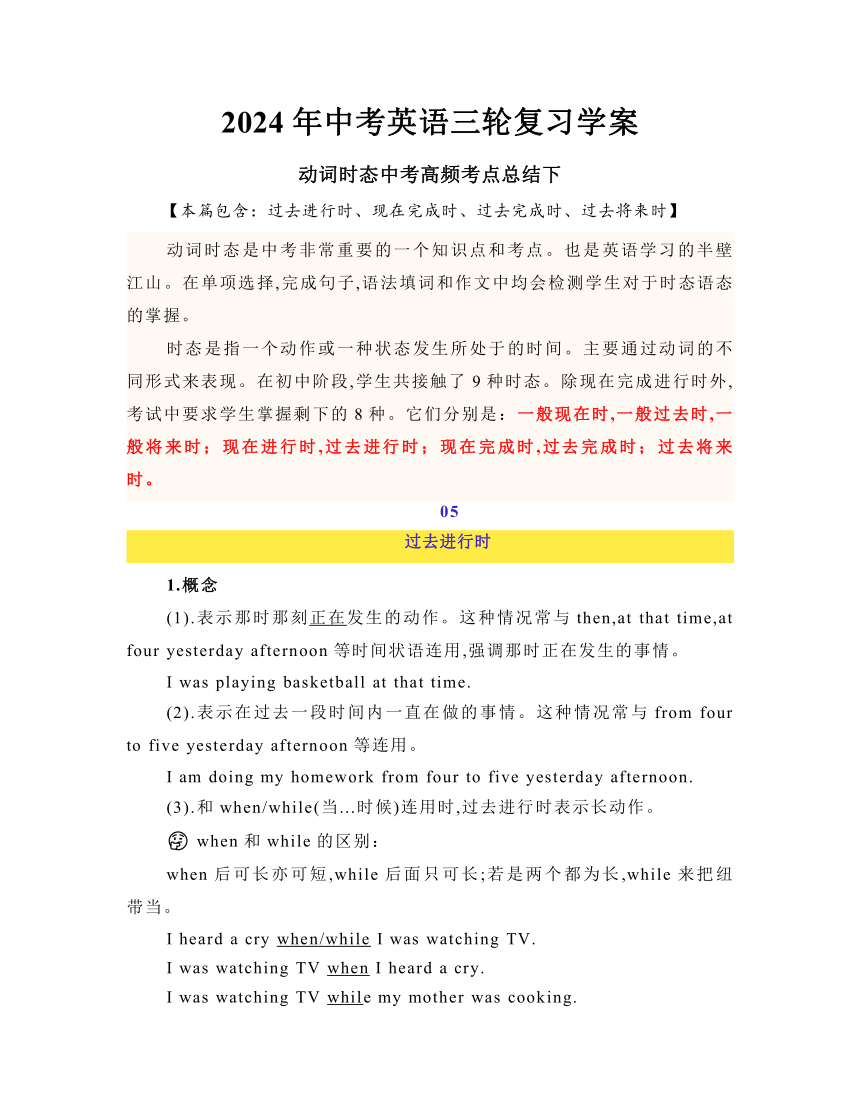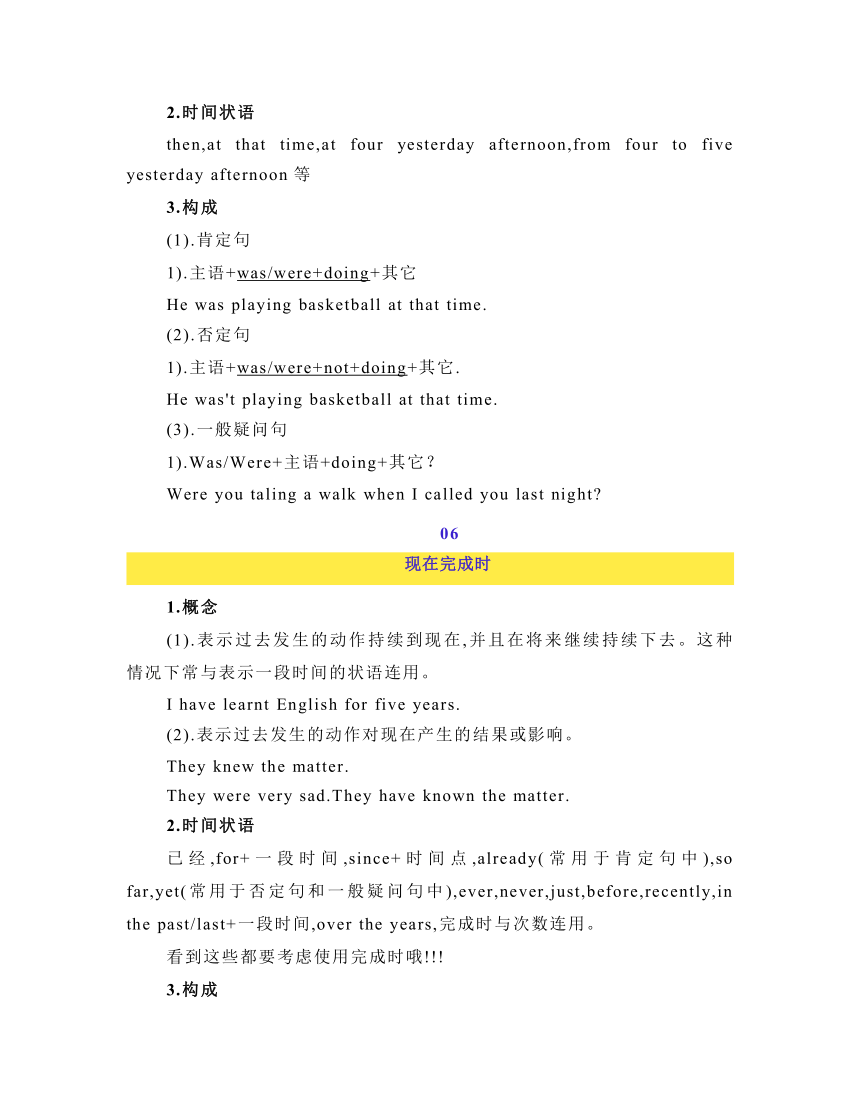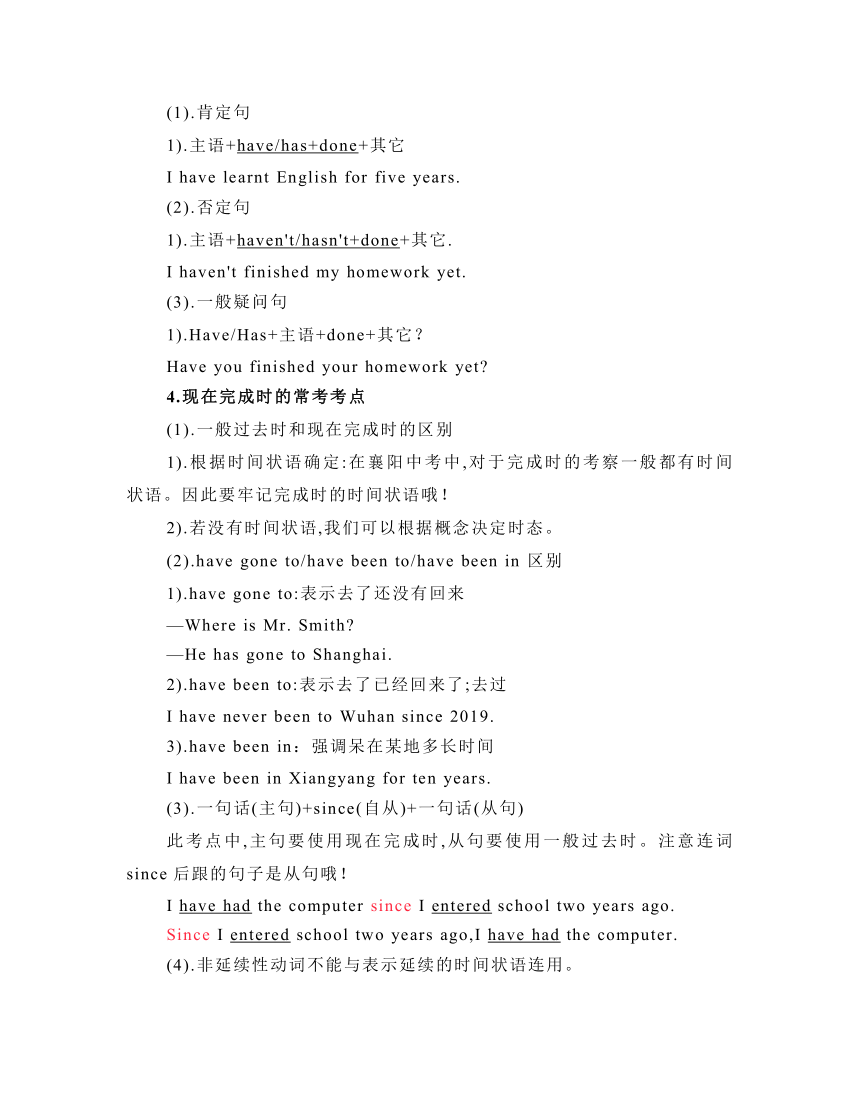2024年中考英语三轮复习学案动词时态中考高频考点总结下
文档属性
| 名称 | 2024年中考英语三轮复习学案动词时态中考高频考点总结下 |  | |
| 格式 | docx | ||
| 文件大小 | 19.8KB | ||
| 资源类型 | 教案 | ||
| 版本资源 | 通用版 | ||
| 科目 | 英语 | ||
| 更新时间 | 2024-03-31 23:03:12 | ||
图片预览



文档简介
2024年中考英语三轮复习学案
动词时态中考高频考点总结下
【本篇包含:过去进行时、现在完成时、过去完成时、过去将来时】
动词时态是中考非常重要的一个知识点和考点。也是英语学习的半壁江山。在单项选择,完成句子,语法填词和作文中均会检测学生对于时态语态的掌握。
时态是指一个动作或一种状态发生所处于的时间。主要通过动词的不同形式来表现。在初中阶段,学生共接触了9种时态。除现在完成进行时外,考试中要求学生掌握剩下的8种。它们分别是:一般现在时,一般过去时,一般将来时;现在进行时,过去进行时;现在完成时,过去完成时;过去将来时。
05
过去进行时
1.概念
(1).表示那时那刻正在发生的动作。这种情况常与then,at that time,at four yesterday afternoon等时间状语连用,强调那时正在发生的事情。
I was playing basketball at that time.
(2).表示在过去一段时间内一直在做的事情。这种情况常与from four to five yesterday afternoon等连用。
I am doing my homework from four to five yesterday afternoon.
(3).和when/while(当...时候)连用时,过去进行时表示长动作。
when和while的区别:
when后可长亦可短,while后面只可长;若是两个都为长,while来把纽带当。
I heard a cry when/while I was watching TV.
I was watching TV when I heard a cry.
I was watching TV while my mother was cooking.
2.时间状语
then,at that time,at four yesterday afternoon,from four to five yesterday afternoon等
3.构成
(1).肯定句
1).主语+was/were+doing+其它
He was playing basketball at that time.
(2).否定句
1).主语+was/were+not+doing+其它.
He was't playing basketball at that time.
(3).一般疑问句
1).Was/Were+主语+doing+其它?
Were you taling a walk when I called you last night
06
现在完成时
1.概念
(1).表示过去发生的动作持续到现在,并且在将来继续持续下去。这种情况下常与表示一段时间的状语连用。
I have learnt English for five years.
(2).表示过去发生的动作对现在产生的结果或影响。
They knew the matter.
They were very sad.They have known the matter.
2.时间状语
已经,for+一段时间,since+时间点,already(常用于肯定句中),so far,yet(常用于否定句和一般疑问句中),ever,never,just,before,recently,in the past/last+一段时间,over the years,完成时与次数连用。
看到这些都要考虑使用完成时哦!!!
3.构成
(1).肯定句
1).主语+have/has+done+其它
I have learnt English for five years.
(2).否定句
1).主语+haven't/hasn't+done+其它.
I haven't finished my homework yet.
(3).一般疑问句
1).Have/Has+主语+done+其它?
Have you finished your homework yet
4.现在完成时的常考考点
(1).一般过去时和现在完成时的区别
1).根据时间状语确定:在襄阳中考中,对于完成时的考察一般都有时间状语。因此要牢记完成时的时间状语哦!
2).若没有时间状语,我们可以根据概念决定时态。
(2).have gone to/have been to/have been in 区别
1).have gone to:表示去了还没有回来
—Where is Mr. Smith
—He has gone to Shanghai.
2).have been to:表示去了已经回来了;去过
I have never been to Wuhan since 2019.
3).have been in:强调呆在某地多长时间
I have been in Xiangyang for ten years.
(3).一句话(主句)+since(自从)+一句话(从句)
此考点中,主句要使用现在完成时,从句要使用一般过去时。注意连词since后跟的句子是从句哦!
I have had the computer since I entered school two years ago.
Since I entered school two years ago,I have had the computer.
(4).非延续性动词不能与表示延续的时间状语连用。
1).现在完成时表示过去某个时间发生的动作一直持续到现在,与一段时间连用时,谓语动词不能使用短暂性动词,谓语动词应该使用延续性动词。
2).延续性动词指的是动作不是一瞬间完成的,例如cook,watch Tv, take a shower等;短暂性动词是指动作一发生就完成了的动词,例如die,leave,begin等。
若时间状语是一段时间,且谓语动词是短暂性动词,我们可以采用以下两种方法。方法一是把短暂性动词换成相应的延续性动词。方法二是使用句型。下面具体介绍:
方法一:短暂性动词换成相应的延续性动词
1).I have bought the computer for two years.
I have had the computer for two years.
2).The movie has begun for over ten minutes.
The movie has been on for over ten minutes.
【注意】常见的短暂性动词及相应的延续性动词
buy-have
borrow/lend-keep
begin/start-be on
die-be dead
leave-be away from
finish-be over
get married-be married
join-be in
fall asleep-be asleep
fall in love with-be in love with
become-be
方法二
使用句型"It is+一段时间+since+从句
1).He has left school for ten years.
He has been away from school for ten years.
It is ten years since he left school. =It has been ten years since he left school.
07
过去完成时
1.概念
(1).表示"过去的过去":即在过去某一时间或某一动作之前已经发生或者完成的动作。
1).By the time I joined the Greener Group,I had cleaned the library for two years.(clean这个动作发生在join之前,join是过去时,clean符合"过去的过去")
2).The movie had been on for over ten years by the time I got to the cinema.("开始"这个动作发生在got之前,got是过去时,"开始“符合"过去的过去")
2.时间状语
by the end of+过去时间,by the time+过去时间,by that time,before I arrived等。【注意 】重点根据概念判断,看我们需要确定时态的这个动作是不是“过去的过去”。
3.构成
(1).肯定句
1).主语+had+done+其它
He went out his way to explain what had happened before.
I had finished breakfast before he arrived.
(2).否定句
1).主语+hadn't+done+其它.
He hadn't finished his homework when I arrived there.
(3).一般疑问句
1).Had+主语+done+其它?
Had he told you to go there earlier
4.过去完成时的常考考点
(1).过去完成时和现在完成时的区别
中考单项选择中特别喜欢考察现在完成时和过去完成时的区别。我们在解题的时候主要看需要判断时态的动词是不是发生在过去的过去,若是,则使用过去完成时。
一个简单的方法是:若题目中出现了完成时的时间状语,此时我们可以看题干中有无过去时的动作或时间,若有,则使用过去完成时。若没有则使用现在完成时。
1.】—When will you hand in your book report
—Sorry, I’m not sure. I writing it yet.
A. didn’t finish
B. don’t finish
C. hadn’t finished
D. haven’t finished
2.—We all went to the cinema except you last night. Why didn’t you come
—Because I that movie twice.
A. have watched
B. had watched
C. was watching
D. would watch
答案:1.D 2.B
(2).过去完成时用于句型"It was the first/second/third...time+that+从句" 这是某人第几次做某事。从句使用过去完成时。
It was the first time that we had met in ten years.
08
过去将来时
同学们刚听到这种时态的时候感觉很诧异,难道还有一个动作既发生在过去,又同时发生在将来吗?
其实过去将来时表示的是:从过去的某一时间看将要发生的动作或者将要处于的状态。这种时态主要用于主句是一般过去时的宾语从句中。宾语从句的时态会受主句的影响。我们在前面已经讲过宾语从句的时态规律。其中"主过从过去"规律说的是若主句是过去时态,则宾语从句也应该使用过去的某种时态。
例如:He says that he will go fishing tomorrow.
如果把主句换成He said,那么宾语从句部分的时态会发生什么样的变化呢?此时根据"主过从过去"规律可知宾语从句部分也要使用过去的某种时态,但是又因为宾语从句“go fishing“的动作还未发生,表示将来。此时宾语的时态就要使用过去将来时了。过去将来时的结构是"would+do"。
He said that he would go fishing tomorrow.
动词时态中考高频考点总结下
【本篇包含:过去进行时、现在完成时、过去完成时、过去将来时】
动词时态是中考非常重要的一个知识点和考点。也是英语学习的半壁江山。在单项选择,完成句子,语法填词和作文中均会检测学生对于时态语态的掌握。
时态是指一个动作或一种状态发生所处于的时间。主要通过动词的不同形式来表现。在初中阶段,学生共接触了9种时态。除现在完成进行时外,考试中要求学生掌握剩下的8种。它们分别是:一般现在时,一般过去时,一般将来时;现在进行时,过去进行时;现在完成时,过去完成时;过去将来时。
05
过去进行时
1.概念
(1).表示那时那刻正在发生的动作。这种情况常与then,at that time,at four yesterday afternoon等时间状语连用,强调那时正在发生的事情。
I was playing basketball at that time.
(2).表示在过去一段时间内一直在做的事情。这种情况常与from four to five yesterday afternoon等连用。
I am doing my homework from four to five yesterday afternoon.
(3).和when/while(当...时候)连用时,过去进行时表示长动作。
when和while的区别:
when后可长亦可短,while后面只可长;若是两个都为长,while来把纽带当。
I heard a cry when/while I was watching TV.
I was watching TV when I heard a cry.
I was watching TV while my mother was cooking.
2.时间状语
then,at that time,at four yesterday afternoon,from four to five yesterday afternoon等
3.构成
(1).肯定句
1).主语+was/were+doing+其它
He was playing basketball at that time.
(2).否定句
1).主语+was/were+not+doing+其它.
He was't playing basketball at that time.
(3).一般疑问句
1).Was/Were+主语+doing+其它?
Were you taling a walk when I called you last night
06
现在完成时
1.概念
(1).表示过去发生的动作持续到现在,并且在将来继续持续下去。这种情况下常与表示一段时间的状语连用。
I have learnt English for five years.
(2).表示过去发生的动作对现在产生的结果或影响。
They knew the matter.
They were very sad.They have known the matter.
2.时间状语
已经,for+一段时间,since+时间点,already(常用于肯定句中),so far,yet(常用于否定句和一般疑问句中),ever,never,just,before,recently,in the past/last+一段时间,over the years,完成时与次数连用。
看到这些都要考虑使用完成时哦!!!
3.构成
(1).肯定句
1).主语+have/has+done+其它
I have learnt English for five years.
(2).否定句
1).主语+haven't/hasn't+done+其它.
I haven't finished my homework yet.
(3).一般疑问句
1).Have/Has+主语+done+其它?
Have you finished your homework yet
4.现在完成时的常考考点
(1).一般过去时和现在完成时的区别
1).根据时间状语确定:在襄阳中考中,对于完成时的考察一般都有时间状语。因此要牢记完成时的时间状语哦!
2).若没有时间状语,我们可以根据概念决定时态。
(2).have gone to/have been to/have been in 区别
1).have gone to:表示去了还没有回来
—Where is Mr. Smith
—He has gone to Shanghai.
2).have been to:表示去了已经回来了;去过
I have never been to Wuhan since 2019.
3).have been in:强调呆在某地多长时间
I have been in Xiangyang for ten years.
(3).一句话(主句)+since(自从)+一句话(从句)
此考点中,主句要使用现在完成时,从句要使用一般过去时。注意连词since后跟的句子是从句哦!
I have had the computer since I entered school two years ago.
Since I entered school two years ago,I have had the computer.
(4).非延续性动词不能与表示延续的时间状语连用。
1).现在完成时表示过去某个时间发生的动作一直持续到现在,与一段时间连用时,谓语动词不能使用短暂性动词,谓语动词应该使用延续性动词。
2).延续性动词指的是动作不是一瞬间完成的,例如cook,watch Tv, take a shower等;短暂性动词是指动作一发生就完成了的动词,例如die,leave,begin等。
若时间状语是一段时间,且谓语动词是短暂性动词,我们可以采用以下两种方法。方法一是把短暂性动词换成相应的延续性动词。方法二是使用句型。下面具体介绍:
方法一:短暂性动词换成相应的延续性动词
1).I have bought the computer for two years.
I have had the computer for two years.
2).The movie has begun for over ten minutes.
The movie has been on for over ten minutes.
【注意】常见的短暂性动词及相应的延续性动词
buy-have
borrow/lend-keep
begin/start-be on
die-be dead
leave-be away from
finish-be over
get married-be married
join-be in
fall asleep-be asleep
fall in love with-be in love with
become-be
方法二
使用句型"It is+一段时间+since+从句
1).He has left school for ten years.
He has been away from school for ten years.
It is ten years since he left school. =It has been ten years since he left school.
07
过去完成时
1.概念
(1).表示"过去的过去":即在过去某一时间或某一动作之前已经发生或者完成的动作。
1).By the time I joined the Greener Group,I had cleaned the library for two years.(clean这个动作发生在join之前,join是过去时,clean符合"过去的过去")
2).The movie had been on for over ten years by the time I got to the cinema.("开始"这个动作发生在got之前,got是过去时,"开始“符合"过去的过去")
2.时间状语
by the end of+过去时间,by the time+过去时间,by that time,before I arrived等。【注意 】重点根据概念判断,看我们需要确定时态的这个动作是不是“过去的过去”。
3.构成
(1).肯定句
1).主语+had+done+其它
He went out his way to explain what had happened before.
I had finished breakfast before he arrived.
(2).否定句
1).主语+hadn't+done+其它.
He hadn't finished his homework when I arrived there.
(3).一般疑问句
1).Had+主语+done+其它?
Had he told you to go there earlier
4.过去完成时的常考考点
(1).过去完成时和现在完成时的区别
中考单项选择中特别喜欢考察现在完成时和过去完成时的区别。我们在解题的时候主要看需要判断时态的动词是不是发生在过去的过去,若是,则使用过去完成时。
一个简单的方法是:若题目中出现了完成时的时间状语,此时我们可以看题干中有无过去时的动作或时间,若有,则使用过去完成时。若没有则使用现在完成时。
1.】—When will you hand in your book report
—Sorry, I’m not sure. I writing it yet.
A. didn’t finish
B. don’t finish
C. hadn’t finished
D. haven’t finished
2.—We all went to the cinema except you last night. Why didn’t you come
—Because I that movie twice.
A. have watched
B. had watched
C. was watching
D. would watch
答案:1.D 2.B
(2).过去完成时用于句型"It was the first/second/third...time+that+从句" 这是某人第几次做某事。从句使用过去完成时。
It was the first time that we had met in ten years.
08
过去将来时
同学们刚听到这种时态的时候感觉很诧异,难道还有一个动作既发生在过去,又同时发生在将来吗?
其实过去将来时表示的是:从过去的某一时间看将要发生的动作或者将要处于的状态。这种时态主要用于主句是一般过去时的宾语从句中。宾语从句的时态会受主句的影响。我们在前面已经讲过宾语从句的时态规律。其中"主过从过去"规律说的是若主句是过去时态,则宾语从句也应该使用过去的某种时态。
例如:He says that he will go fishing tomorrow.
如果把主句换成He said,那么宾语从句部分的时态会发生什么样的变化呢?此时根据"主过从过去"规律可知宾语从句部分也要使用过去的某种时态,但是又因为宾语从句“go fishing“的动作还未发生,表示将来。此时宾语的时态就要使用过去将来时了。过去将来时的结构是"would+do"。
He said that he would go fishing tomorrow.
同课章节目录
